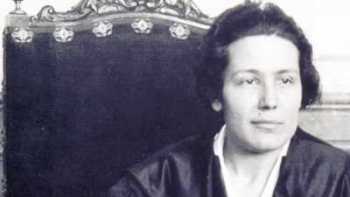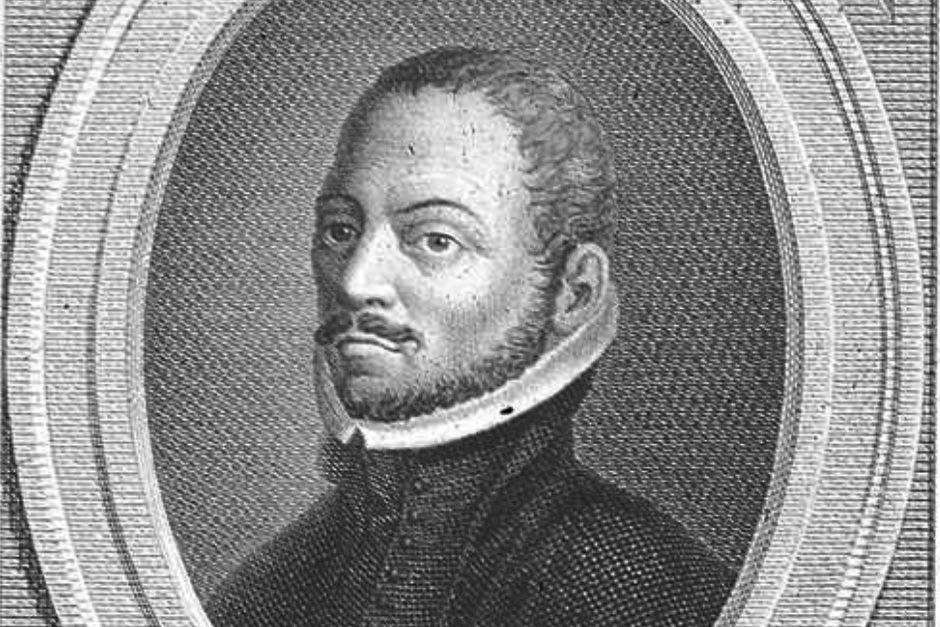October 11
Saint’s Day for Soledad, Nicasio, Germán and Plácido.
1469 - Interview Duenas (Palencia) of Ferdinand II of Aragon and Isabella I of Castile, who ruled the marriage of both, future Catholic Monarchs.

Victoria Kent - Photo www.rtve.es
1700 - Carlos II of Spain appoints successor to the French pretender to the crown of Spain.
1811 - General Mina arrives at Ayerbe to besiege and attack the large French garrison that was fortified in the palace of the Marquis of Ayerbe.
1821 - Province of Nicaragua and Costa Rica proclaimed its independence from Spain.
1835 - Decree of extinction, with exceptions, of religious orders in the country and the confiscation of church property.
1934 - The death penalty was restored by garrote, after the failed revolutionary attempt.
1960 - The first 60 kg of enriched uranium for use in research and experimentation arrives in Spain which thus joins the atomic age.
1976 - First time a South American King of Spain steps down to move Juan Carlos I on a diplomatic mission to Colombia.
1977 - Victoria Kent, who brought in many reforms as general director for prisons during the Second Republic, and was also the first woman in Spain to stand as a lawyer in the Spanish courts, returned to Spain after almost 40 years in exile. She was against women being given the vote, saying Spanish women were not yet prepared for the ballot.
1990 - Spain joins the World Charter of the Rights of the Child.
1997 - In Madrid the reform of the Teatro Real, was converted for Opera.
Births
1799 - Paula Montal, nun and saint (d. 1889)
1866 - Carlos Arniches, dramatist and playwright, author of farces and comedies and creator of the comic genre "grotesque tragedy" (d, 1943)
1872 - Fermina Oliva y Ocaña, one of the Spanish survivors of Titanic on April 1912 (d. 1969)
1928 - Alfonso de Portago, the 17th Marquis of Portago, in London, Formula One driver and bobsledder (d. 1957)
1936 - The novelist Alberto Vázquez-Figueroa, in Santa Cruz de Tenerife, who also invented a reverse osmosis desalinisation system powered by gravity.
1941 - Eugenio Jofra Bafalluy, comedian (d. 2001)
1944 - Joan Gaspart, entrepreneur.
1944 - Javier Sáenz de Cosculluela, politician.
1948 - Cecilia, singer-songwriter (d. 1976).
1963 - Jordi Villacampa, basketball player and manager.
1965 - Juan Ignacio Cirac Sasturain, physicist.
1966 - Pau Donés, musician.
1967 - José Ángel Hevia, bagpipe player.
1968 - José Antonio Fortea Cucurull, religious theologian.
1977 - Laura Gallego García, writer.

Born in Valdepeñas, Spain around 1561, Balbuena came to the New World as a young adult and lived in Guadalajara, Jalisco and Mexico City, where he studied theology. In 1606 he returned to Spain and earned the degree of Doctor of Theology, and rose within the Church to become Abbot in Jamaica (1610) and one of the early Bishops of Puerto Rico (1620). Despite his priestly duties, he found time to write long and elegant verses which are excellent examples of the Baroque tendency to heavily load (and sometimes overload) poetry with highly detailed descriptions.
Unfortunately, many of his manuscripts and his library were burned by Dutch pirates during a 1625 attack on Puerto Rico. He died two years later.
Perhaps his best work is Grandeza mexicana (Mexico's Grandeur, published in 1604), in which he replies in elegant and lyrical verse to a nun who asked him for a description of the young Spanish city of Mexico. Balbuena takes advantage of this opportunity to present a detailed inventory of the complicated, luxurious and beautiful city as he knew it almost 100 years after the arrival of Hernán Cortés. The details he provides include physical geography, the climate, the surroundings, the architecture, the vegetation, the different human types, the animals, all in great detail. The poem is high-sounding, but at the same time simple; it is direct, but also contains complicated metaphors, word plays, majestic adjectives, and a rich catalogue of the lexicon. Balbuena's works represent some of the best of the Baroque's love of colour, detail, ornamentation and intellectual playfulness. It also stands as a monument to the pride in the New World that many transplanted Spaniards shared with the "criollo" (the Americans descended from Spanish or Portuguese families). A critical edition of Grandeza mexicana, prepared with introduction, notes and bibliography by Asima Saad Maura appeared in 2011 (Madrid: Cátedra); it takes into consideration the two different editions published during Balbuena's life, each one dedicated to a different person. Saad Maura's edition also includes Balbuena's treaty on poetry.
In 2007, well-known Spanish translator, Margaret Sayers Peden collected Mexican literature including that of Bernardo de Balbuena's in order to combine and edit the book Mexican Writers on Writing (Trinity University Press).
(fragment)
Mexico's Grandeur (1604) by Bernardo de Balbuena
Of the famous Mexico the seat,
origin and grandeur of edifices
horses, streets, treatment, complement,
letters, virtues, variety of professions.
gifts, occasions of contentment,
immortal spring and its indications,
illustrious government, religion, state,
all in this speech is written. ...
It is ordered that I write you some indication
that I have arrived in this famous city,
center of perfection, hinge of the world;
its seat, its populous greatness,
its rare things, its riches and its treatment,
its illustrious people, its pompous labour.
in all, a most perfect portrait
you ask of Mexican Greatness,
be it expensive, be it modest.
With most beautiful distant views,
outings, recreations and country-feasts,
orchards, farms, mills, and groves.
malls, gardens, thickets
of various plants and fruits
in flower, in blossom, immature and ripe.
There are not as many stars
in the sky, as flowers in her garland
nor as many virtues in it than her. (d. 1627)
1931 - Jose Juan Dominates, founding president of the Spanish shipping company Trasmediterránea and outstanding doctor.
1936 - Antonio José Martínez Palacios, composer.
1940 – Lluís Companys, lawyer and politician, 123rd President of Catalonia (b. 1882)
1950 - Conde de Romanones, Prime Minister of Spain (1912, 1915- 1917 and 1918-1919).
1982 - Josep Renau, painter and poster.
1987 - Koldo Mitxelena, Basque philosopher (b. 1915)
2002 - Antonio González y González, chemist (b. 1917)
2007 - Javier de Castro, metal unionist (b. 1944)
2010 - Francisco Suarez Cardona, ornithologist and ecologist (b. 1953)
2013 – María de Villota, race car driver (b. 1980)
